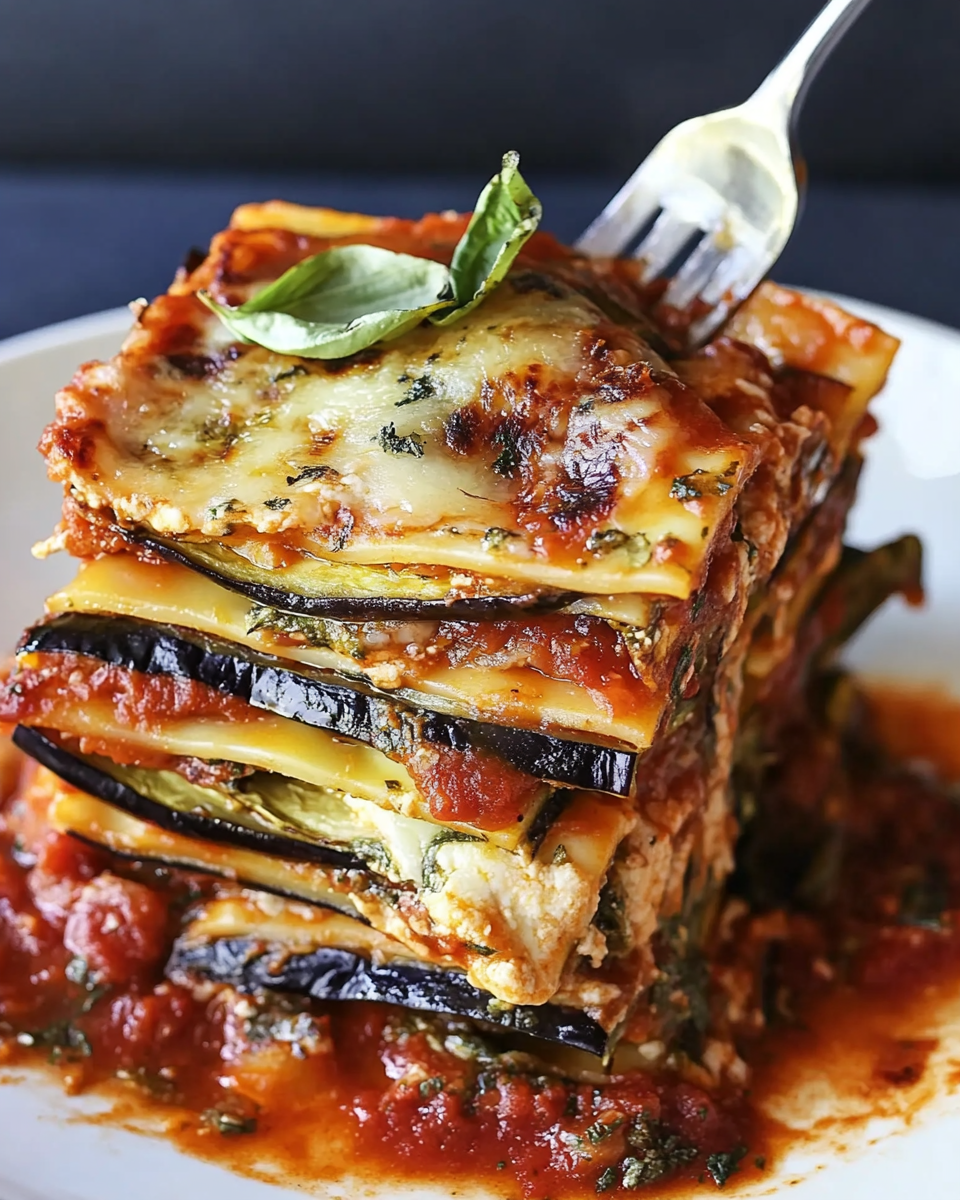The Richness of a Slow-Simmered Tomato Sauce
The heart of any great lasagne is its sauce, and this recipe’s tomato sauce is crafted with care and patience. Slowly cooked onions soften into sweetness, while garlic adds aromatic depth. The tomato purée and passata provide a rich base, enhanced by the subtle acidity of red wine vinegar and balanced with a pinch of caster sugar to tame the natural tartness.
The addition of fresh basil leaves near the end of cooking infuses the sauce with bright herbal notes, lifting its flavor profile. This careful layering of flavors results in a sauce that is both robust and nuanced, complementing the fresh vegetables perfectly without overpowering them.
Grilling Vegetables for Texture and Flavor
Grilling the aubergine and courgette slices is a critical step that adds complexity to the dish. The vegetables become tender while developing lightly charred edges, introducing smoky undertones that enhance their natural sweetness. This cooking method also helps prevent the vegetables from becoming too watery during baking, which can sometimes be an issue with softer produce.
The aubergine’s creamy interior contrasts beautifully with the courgette’s slightly firmer bite, while the roasted peppers add bursts of sweetness and a subtle smokiness, rounding out the vegetable medley. Brushing the slices with olive oil before grilling ensures they remain moist and flavorful.
Fresh Basil: The Aromatic Tie That Binds
Basil is used generously throughout the lasagne, both in the sauce and layered within the vegetable and cheese fillings. Its fragrant, peppery notes bring freshness that balances the richness of the cheese and the earthiness of the grilled vegetables. Torn basil leaves scattered between the layers create aromatic pockets of flavor, while extra basil garnishes add a lively, green finish.
Using fresh basil rather than dried herbs significantly elevates the dish, providing a vibrancy that is crucial to the overall flavor experience. It ties together the various components harmoniously, ensuring the lasagne remains light despite the indulgent cheeses.
Cheese Layers: Creaminess and Depth
The choice of cheeses—mozzarella and parmesan—provides the perfect balance of creamy meltiness and sharp umami. Mozzarella offers a milky, soft texture that blankets the vegetables, while parmesan’s aged, salty character adds depth and a satisfying savory finish.
The cheeses melt and mingle with the tomato sauce and vegetables during baking, creating luscious, gooey layers that contrast with the slight firmness of the fresh pasta sheets and the charred vegetables. This combination ensures the lasagne is both rich and balanced, satisfying without being overly heavy.
The Advantage of Fresh Lasagne Sheets
Using fresh lasagne sheets rather than dried pasta contributes to the overall tenderness and luxury of this dish. Fresh pasta cooks more quickly and retains a delicate texture that pairs well with the soft grilled vegetables and creamy cheeses. It also absorbs the sauce more readily, resulting in a moist and cohesive bake.
The thin, supple sheets help to showcase the layers rather than overpowering them, allowing the vibrant colors and textures of the vegetables and cheeses to shine through.
Baking to Golden Perfection
Baking the assembled lasagne until golden and bubbling is essential to developing the signature textures of a great lasagne. The top layer of cheese caramelizes slightly, forming a golden crust that adds a satisfying textural contrast to the creamy interior.
Allowing the dish to rest after baking is important as it lets the layers settle and the flavors meld. This rest period also makes the lasagne easier to slice and serve, ensuring neat portions and a pleasant dining experience.
Nutritional Benefits of a Vegetable-Forward Lasagne
This lasagne offers a well-rounded nutritional profile that balances indulgence with healthfulness. The vegetables provide fiber, vitamins, and minerals, contributing to digestive health and overall vitality. Aubergine and courgette are low in calories but high in antioxidants, while roasted peppers add vitamin C and carotenoids.
The moderate fat content primarily comes from heart-healthy olive oil and the cheeses, providing essential fatty acids and protein. Carbohydrates from fresh pasta offer energy, making this dish a satisfying and nourishing meal option.
For those mindful of nutrition, the recipe can be adapted by using lower-fat cheese options or wholegrain pasta to boost fiber intake further.
Perfect for Entertaining and Family Meals
The layered nature and generous portions of this lasagne make it an ideal dish for entertaining or feeding larger families. It can easily be doubled or tripled to accommodate more guests without losing any of its flavor or texture.
Its vegetarian status also makes it a crowd-pleaser for diverse dietary needs, offering a rich, satisfying alternative to meat-based dishes. Serving alongside a crisp green salad or garlic bread rounds out the meal beautifully.
Seasonal Versatility and Ingredient Adaptations
Though this recipe shines in the summer with fresh garden vegetables, it is adaptable year-round. When aubergines, courgettes, or roasted peppers aren’t in season, substitutes like roasted butternut squash, spinach, or sun-dried tomatoes can be incorporated to maintain flavor and texture variety.
The tomato sauce can also be tailored with additional herbs such as oregano or thyme, depending on preference. This flexibility makes the lasagne a reliable go-to dish for any season.
Conclusion
Summer Vegetable Lasagne is a vibrant and satisfying dish that celebrates the best of seasonal produce layered with creamy cheeses and a slow-simmered tomato sauce. The grilling of aubergines and courgettes brings smoky complexity, while the fresh basil adds aromatic brightness. Combined with the rich textures of mozzarella and parmesan, this lasagne offers a comforting yet fresh vegetarian meal that is perfect for family dinners or entertaining guests.
The dish balances indulgence with healthfulness, providing a well-rounded meal that is both hearty and light. Its versatility and ability to be adapted make it a year-round favorite that showcases the best of simple, fresh ingredients in a classic Italian preparation. This lasagne invites you to enjoy the flavors of summer in every delicious, layered bite.






